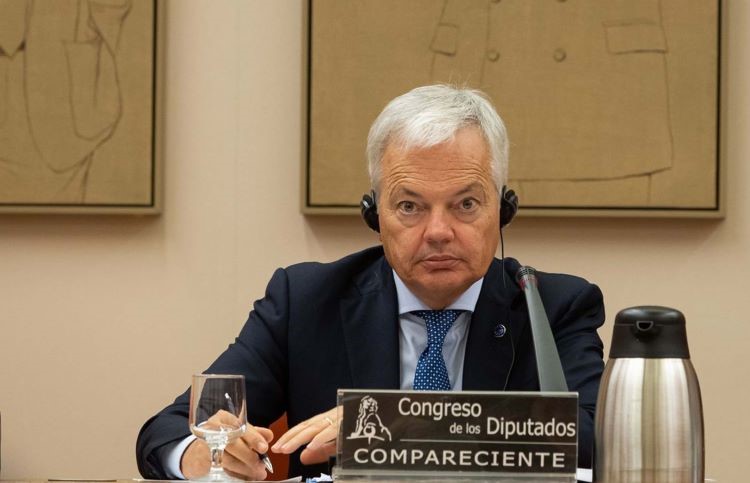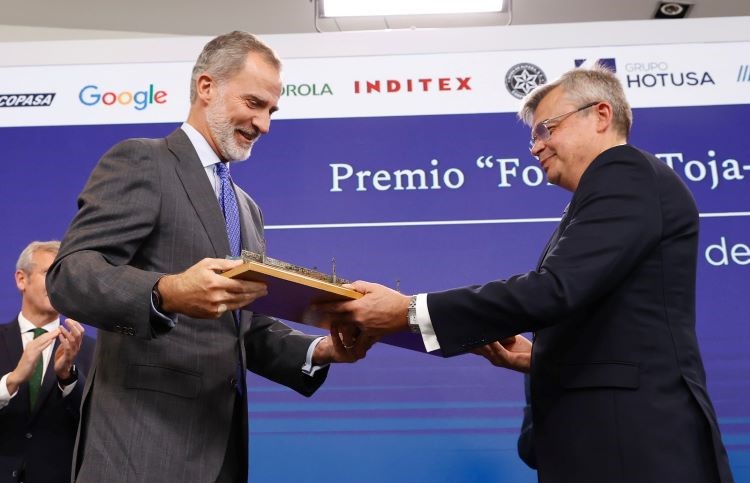Eduardo González
The European Commissioner for Justice, Didier Reynders, warned yesterday before the Congress that the Spanish political parties must agree to renew “as a priority” General Council of the Judiciary (CGPJ) to, “immediately after this renewal”, start the procedure to reform the model of election of members.
“The Commission recommends proceeding with the renewal as a priority,” he said during his appearance before the Joint Commission for the European Union, in which he presented the conclusions and recommendations of the Commission’s 2022 Report on the Rule of Law in Spain. “We explicitly urge first of all the renewal of the Council” so that, “immediately after this renewal, the procedure aimed at adapting the rules to European standards, which provide that the CGPJ is composed of a majority of judges and that they are elected by their peers,” continued the Belgian commissioner.
“We are only asking that, when a General Council of the Judiciary is established, a number of rules be respected,” including that the Council be “composed of a majority of judges elected by their peers,” he continued. “It is not an imposition of the European Commission, but a decision of the Committee of Ministers of the Council of Europe, of which Spain is a member, and which was taken in 2010, therefore, it is not new,” warned the commissioner. Reynders also assured that, on the occasion of the upcoming Spanish Presidency, the Commission “will pay close attention to the reforms to be carried out”, and warned that the Court of Justice could open an infringement procedure against Spain “for failure to comply with the rules related to the independence of the judiciary”.
Reynders’ position clashes with that of the Popular Party, which has called for both the renewal of the CGPJ and the reform of the system to be carried out at the same time. Hours before appearing before Congress, the commissioner met at the headquarters of the European Commission in Madrid with the head of Institutional Action of the PP, Esteban González Pons, who assured that his party is willing to renew the Council as long as the reform of the system for electing the positions is negotiated at the same time.
“He has asked me to renew immediately and reform the model, let’s negotiate everything at the same time,” Pons told the press after the meeting, which was also attended by representatives of the two main associations of judges, the Professional Association of the Judiciary and the Francisco de Vitoria. During the meeting, Reynders clearly rejected the PP’s proposal, stating that what is urgent is to renew the General Council of the Judiciary and, only after that, a reform of the model can be initiated.
Llop and Bolaños
Also before his appearance before the Congress, Reynders was received by the Minister of Justice, Pilar Llop, who insisted that the problem of the CGPJ is due to the “blockage generated by the PP” and, for this reason, agreed with the European Commissioner that what is necessary is that, “once and for all”, the renewal of the Council be carried out.
In statements to the press after the meeting, the Minister did not clarify whether during the meeting the part of the European Commission’s report on the rule of law had been addressed in which it was recommended to Spain to reform the model of election of the members of the CGPJ so that the judges elect their representatives. “I have conveyed to Commissioner Reynders that we are facing a situation of deadlock and that the report would not mention a possible reform of the model if the PP had complied with the Constitution four years ago” and had accepted an agreement with the PSOE to renew the CGPJ, she declared. “The priority is not to talk about which model is valid for European countries, but to renew the Council”, because the current blockage “is causing damage to our judicial institutions and also in our prestige in Europe and in our international prestige”, she said. The Commissioner, she assured, “has understood” that the PP is responsible for this blockage.
Previously, the European Commissioner was received by the Minister of the Presidency, Félix Bolaños, who agreed with Reynders on the “need to renew the General Council of the Judiciary as a matter of urgency and priority, given that its members have had their mandates expired for more than three years”. Likewise, Bolaños presented the European Commissioner with a list of “the 19 excuses” that the PP has made since 2020 for not reaching an agreement, which, in his opinion, can be summarized in three categories: those related to the electoral moment, the rejection of any possible pact with this Government and those that accept an agreement, but with conditions.
Today, Friday, the last day of his visit to Spain, Didier Reynders will meet with the President of the Supreme Court and the CGPJ, Carlos Lesmes; the President of the Constitutional Court (TC), Pedro González-Trevijano; and the State Attorney General, Álvaro García Ortiz. The European Commissioner was received on Wednesday by the Minister of Foreign Affairs, José Manuel Albares, at the Palacio de Viana, as part of the round of contacts initiated the day before by the Minister with members of the European Commission to prepare the Spanish Presidency of the EU, which will take place in the second half of 2023. Reynders also met yesterday with the Minister of Consumer Affairs, Alberto Garzón.







